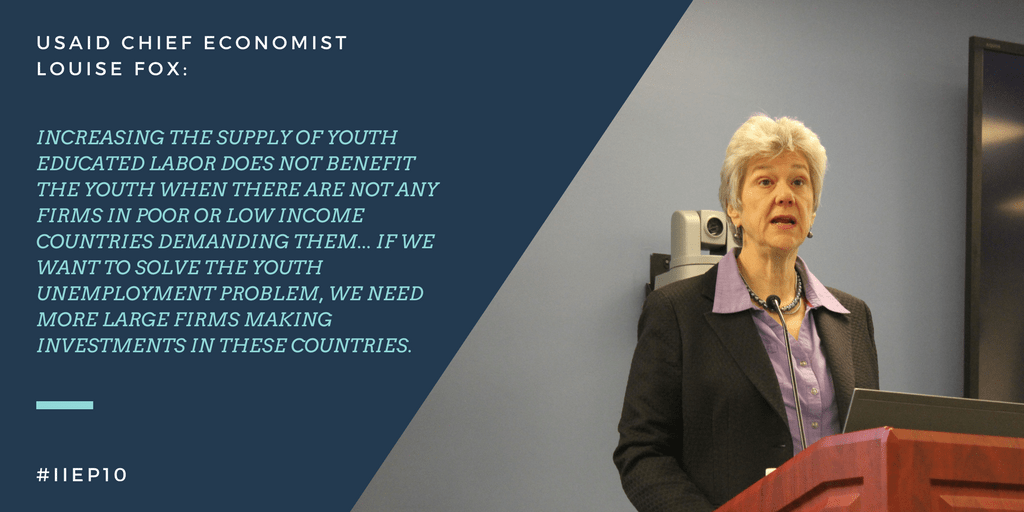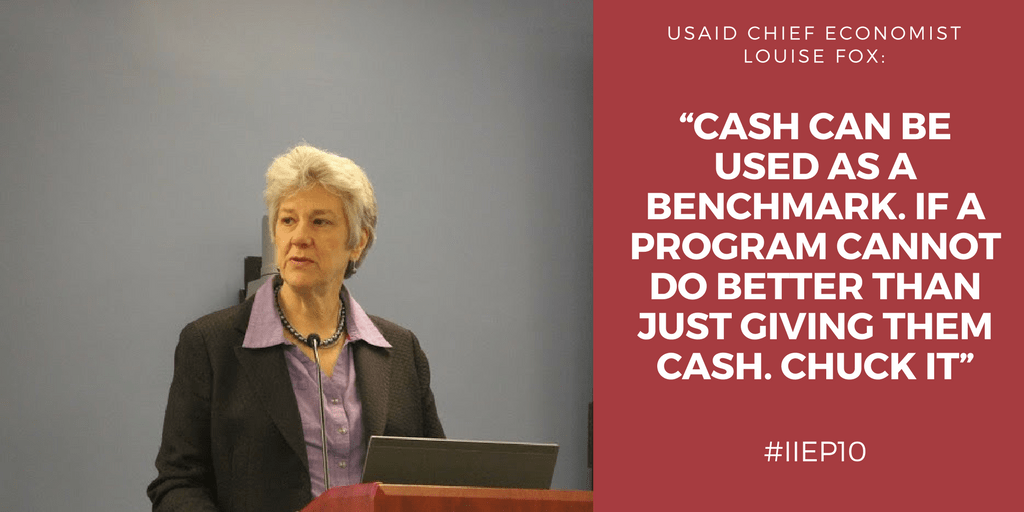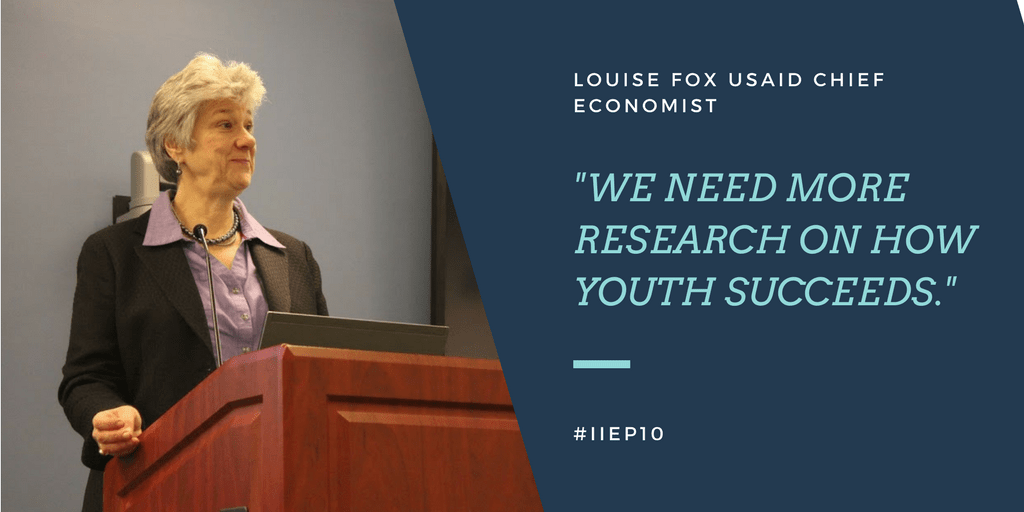Originally published on November 30, 2017
Though many countries in sub-Saharan Africa have experienced some of the world’s highest economic growth rates, employment opportunities and income are not following suit. Eighty-eight percent of individuals in this region say that a lack of job opportunities is a very large problem in their communities and with a staggering forty-one percent of people in sub-Saharan Africa living on less than $1.25 a day, this fear seems to be supported. (Simmons) Hundred of organizations are flocking to this region with the hopes of teaching youths technical skills, which they can then theoretically use to obtain a job. Their efforts, however, are not nearly as effective as they could be.
The premier event in our special series in celebration of IIEP’s 10th anniversary featured Louise Fox, Chief Economist at USAID. Fox, presenting on her paper “The evidence is in: How should youth employment programs in low-income countries be designed?,” released her findings on youth employment programs in low-income countries—specifically examining which policies and programs most effectively raise youth employment and why.
 At the crux of Louise Fox’s argument is the finding that while youth training programs focus on increasing the supply of qualified workers, they do not take into account the demand within the workforce for such workers. Even if programs are effective at producing young individuals who are ready to enter the workforce, without job opportunities these now-qualified youths will still be unemployed. As Fox phrased it, “if you decide to start a program to help youth enter into the workforce, you are catering to the elite.” For the organisations leading these programs, acting as though a program is going to help people in developing countries get work in firms misunderstands the makeup of the economy they are trying to aid. In low-income countries, many citizens make money from household enterprises, i.e. working for themselves from their own home. The lack of understanding about how to aid these ‘non-elite’ individuals working at home in rural areas is even further exacerbated by the fact that of the hundreds of the youth-employment programs Louise Fox researched, only two actually took place in rural communities.
At the crux of Louise Fox’s argument is the finding that while youth training programs focus on increasing the supply of qualified workers, they do not take into account the demand within the workforce for such workers. Even if programs are effective at producing young individuals who are ready to enter the workforce, without job opportunities these now-qualified youths will still be unemployed. As Fox phrased it, “if you decide to start a program to help youth enter into the workforce, you are catering to the elite.” For the organisations leading these programs, acting as though a program is going to help people in developing countries get work in firms misunderstands the makeup of the economy they are trying to aid. In low-income countries, many citizens make money from household enterprises, i.e. working for themselves from their own home. The lack of understanding about how to aid these ‘non-elite’ individuals working at home in rural areas is even further exacerbated by the fact that of the hundreds of the youth-employment programs Louise Fox researched, only two actually took place in rural communities.
 So does “catering to the elite” even work? In many cases, no. Most of the programs that promote youth employment in lower-income countries do not succeed, and of the ones that do, there is evidence that they are causing a lot of displacement. This ineffectiveness is largely due to the fact that there are not enough firms hiring, as explored above, but also because the technical skills being taught in these training programs are not the skills worth teaching in the first place. If we ask firms in sub-Saharan Africa “what skills are lacking among youth?,” it is not the skills that are being taught by these programs. Instead, firms see that youths need education on non-cognitive, soft skills such as timeliness, teamwork, and self regulation. Composite programs blending together training in technical skills and cognitive skills do have slightly higher efficacy rates, but they are often not cost effective and the organisations running the programs aren’t sure what, within their program, led to this improvement.
So does “catering to the elite” even work? In many cases, no. Most of the programs that promote youth employment in lower-income countries do not succeed, and of the ones that do, there is evidence that they are causing a lot of displacement. This ineffectiveness is largely due to the fact that there are not enough firms hiring, as explored above, but also because the technical skills being taught in these training programs are not the skills worth teaching in the first place. If we ask firms in sub-Saharan Africa “what skills are lacking among youth?,” it is not the skills that are being taught by these programs. Instead, firms see that youths need education on non-cognitive, soft skills such as timeliness, teamwork, and self regulation. Composite programs blending together training in technical skills and cognitive skills do have slightly higher efficacy rates, but they are often not cost effective and the organisations running the programs aren’t sure what, within their program, led to this improvement.
 What, then, would help improve youth-employment programs and subsequently boost employment? Fox recommends giving loans to larger enterprises and also not shying away from giving cash instead of training to individuals. By investing in larger firms, employment demand will increase giving potential employees a better opportunity to be hired. Counterintuitively, Fox informed the audience that “cash is really cheap,” meaning that if a program’s training is not cost effective and not showing positive results, simply giving individuals money might be the better option. This is not to say that programs teaching youths skills are something to be given up on, but, instead, that these programs need to conduct more research on what works, why it works, and whether it’s cost effective, while consciously developing rural area programs. As for urban areas, more digital employment such as AirBnb and Taskrabbit could help individuals within these low-income countries.
What, then, would help improve youth-employment programs and subsequently boost employment? Fox recommends giving loans to larger enterprises and also not shying away from giving cash instead of training to individuals. By investing in larger firms, employment demand will increase giving potential employees a better opportunity to be hired. Counterintuitively, Fox informed the audience that “cash is really cheap,” meaning that if a program’s training is not cost effective and not showing positive results, simply giving individuals money might be the better option. This is not to say that programs teaching youths skills are something to be given up on, but, instead, that these programs need to conduct more research on what works, why it works, and whether it’s cost effective, while consciously developing rural area programs. As for urban areas, more digital employment such as AirBnb and Taskrabbit could help individuals within these low-income countries.
There are many impoverished, unemployed people in sub-Saharan Africa, but there are also millions of dollars being put forth in aid. It is of the utmost importance that this aid is effective and cost-efficient. Throwing money at a problem and not taking the time to learn what yields the best results, is a fruitless act, and it’s one Louise Fox is helping rectify with her research.
